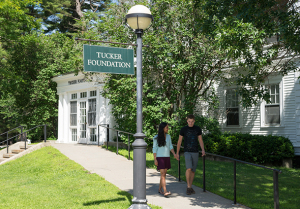The William Jewett Tucker Foundation, established in 1951, was dedicated to President Tucker’s goal that Dartmouth students wishing to change the world would become ethical and moral leaders. Over the years, the Foundation had as its core mission the slogan, “Service, Spirituality, and Social Justice” until the summer of 2014, when it announced that its mission would heretofore be served through two new separate centers — the “Tucker Center for Religious and Spiritual Life” and the “Dartmouth Center for Service.” The plans are to be completed and submitted to the Provost’s office by November and fully implemented by the fall of 2015.
The Review spoke briefly with Tanya Budler ’15, a senior student director of the Foundation on how this move would affect Tucker’s job of coordinating service opportunities, giving grants, and providing a home for spirituality and inter-faith dialogue. She described the move as not being a “split,” with its connotations of faction and friction, but as a “transition” to a better system of organization that had been a long time in coming, not a decision made lightly or, indeed, recently — the idea had been floating around since at least the years of President Jim Yong Kim’s presidency. The decision was made on high within the organization and was “not a part of a conversation with students,” though Budler noted that afterwards, students were involved in the logistics of the shift in all levels upon the insistence of the Provost. Budler expounded that although dedicated involvement in most other campus organizations is more of an exception than a rule, one hundred fifty students showed up to participate in focus groups on how the Foundation should move forward.
As a veteran and manager of all three branches of the current Foundation, Budler feels that the move would be a positive one, as both service and spirituality would find a way to shine on campus without being portrayed as inextricably entwined for students and organizations that would prefer to take part in one but not the other — or end up being neglected by students who might be interested in both. She mentioned that she had joined Tucker in her freshman year as a part of the Language in Motion program without knowing about the Foundation’s spiritual department, in spite of her frequent involvement at the time.
Conversely, Tucker’s spiritual side can overshadow the more secular service opportunities. She explained that there is a vast amount of service on campus that has been and can be done by sports teams, the Greek houses, and unaffiliated individuals, all of whom may not have reached out to Tucker because of its association with religion. Having the Center for Service to coordinate and publicize their efforts “will be huge.” Budler expressed a need to “rebuild [the religious side] for the better” to incorporate more inter-faith dialogue and become as welcoming to other students as it had been through her tenure at the spiritual side. “There’s the Jewish student center. There’s AQ [Aquinas House], the Catholic student center … If you’re a Muslim student or Hindu or even an evangelical Christian there’s nowhere to go on campus … I think [having a place for deep conversation] is powerful.”
The complete plans for the Foundation’s fission will not be finished until November. One event has been confirmed for the spring, which will commemorate the Tucker that was and celebrate the Tucker that is to be. The future entails, according to Budler, a Dartmouth that shall, hopefully, become known as the College on the Hill, with the eyes of the world upon it, with a reputation for service that would be a selling point to incoming classes.
Peter D. Vo also contributed to this article.


Be the first to comment on "Changes at Tucker"